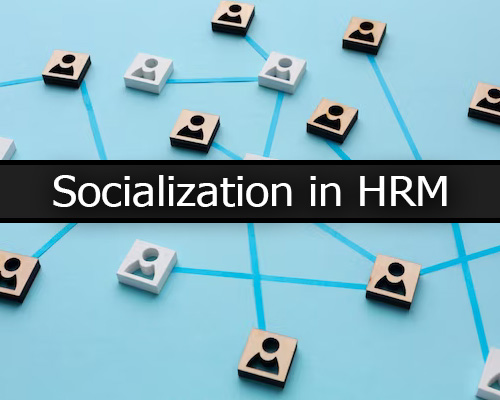Socialization in HRM: Meaning, Dimensions, Importance, Strategies
Socialization in Human Resource Management: Human Resource Management HRM is a vibrant and multidimensional discipline that largely determines the success of an organisation. Within HRM, socialization is noted as one of the most important processes that affect employee integration into an organization’s culture and overall productivity. This article discusses socialization in HRM, its aspects and methods of appropriate presentation.

Also See: Domestic Human Resource Management: Definition and Components
Socialization in HRM: Meaning, Dimensions, Importance, Strategies
Meaning of Socialization in HRM:
Socialization, in the context of HRM, refers to the process through which new employees are introduced to the organization’s culture, values, norms, and expectations. It is not merely an orientation program but a comprehensive approach to integrating individuals into the workplace community. The aim is to facilitate a smooth transition for employees, enabling them to adapt to the organizational environment and become productive members of the team.
Also See: Placement in HRM
Key Dimensions of Socialization in HRM:
- Cultural Socialization:
Cultural socialization involves acquainting employees with the organization’s core values, beliefs, and behavioral expectations. This dimension aims to align the individual’s values with those of the organization, fostering a shared sense of purpose and identity.
- Organizational Socialization:
This dimension focuses on helping employees understand the overall structure, hierarchy, and functioning of the organization. It involves familiarizing individuals with the company’s history, mission, and strategic goals.
- Role Socialization:
Role socialization emphasizes clarifying job roles, responsibilities, and performance expectations. This dimension ensures that employees comprehend their specific contributions to the organization and understand how their roles fit into the larger organizational framework.
- Interpersonal Socialization:
Building interpersonal relationships is crucial for a harmonious work environment. Socialization activities should encourage employees to connect with colleagues, managers, and other stakeholders. Developing effective communication skills and teamwork is a vital aspect of interpersonal socialization.
Also See: Maintenance in HRM
Importance of Socialization in HRM:
- Employee Engagement and Retention: A well-executed socialization process fosters a sense of belonging and commitment among employees. When individuals feel connected to the organization, they are more likely to be engaged and less prone to turnover.
- Enhanced Productivity: Socialization equips employees with the necessary knowledge and skills to perform their roles effectively. When individuals are well-integrated and understand their responsibilities, they can contribute more efficiently to the organization’s goals, leading to increased productivity.
- Cultural Alignment: By instilling organizational values and norms during the socialization process, HRM ensures that employees share a common understanding of the company’s culture. This alignment helps create a cohesive work environment and reduces conflicts arising from divergent beliefs.
- Quick Adaptation: In rapidly changing business environments, employees must adapt swiftly to new challenges. Socialization equips them with the adaptability and resilience needed to navigate change, ensuring the organization remains agile and responsive.
Also See: Redeployment in HRM
Strategies for Effective Socialization in HRM:
- Structured Onboarding Programs: Implementing a well-structured onboarding program is fundamental to successful socialization. This includes comprehensive orientation sessions, introductions to key personnel, and informative materials that convey the organization’s history, mission, and values.
- Mentorship Programs: Pairing new employees with experienced mentors can greatly aid the socialization process. Mentors provide guidance, share insights, and offer a supportive network, helping newcomers integrate into the organizational culture more seamlessly.
- Team-building Activities: Engaging employees in team-building activities promotes interpersonal relationships and collaboration. These activities can be both formal, such as team-building workshops, and informal, such as social events, fostering a sense of camaraderie among team members.
- Continuous Feedback and Evaluation: Regular feedback sessions provide opportunities for employees to receive constructive input on their performance. This ongoing communication ensures that individuals stay aligned with organizational expectations and receive the necessary support for their professional development.
Conclusion:
In conclusion, socialization in HRM is a multifaceted process that goes beyond mere orientation activities. It is a strategic approach to integrating individuals into the fabric of an organization, fostering a shared culture, and aligning individual and organizational goals. The importance of effective socialization cannot be overstated, as it contributes to employee engagement, productivity, and long-term organizational success.
By implementing structured onboarding programs, mentorship initiatives, team-building activities, and continuous feedback mechanisms, HRM can create a workplace environment where employees thrive and contribute meaningfully to the organization’s mission and objectives.
Leave a Reply